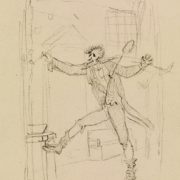CFP: Hoffmann 250: E.T.A. Hoffmann and Other Bodies
University of Oxford
July 2026
E.T.A. Hoffmann has long been recognized for his interest in psychology, and his literary studies of the mind famously inspired Sigmund Freud. But his investigation into problems of embodied experience is equally striking, and turns on the question of how bodily norms are established, perceived, and challenged. His ‘other bodies’ include shapeshifters (‘Der goldene Topf’; ‘Meister Floh’); colonized bodies (‘Das Sanctus’; ‘Haimatochare’); sick and disabled bodies (‘Rat Krespel’; ‘Klein Zaches, genannt Zinnober’; ‘Des Vetters Eckfenster’); pregnant women (‘Das Gelübde’; ‘Vampirismus’); automata and humans who behave as such (‘Der Sandmann’; ‘Die Automate’); aging and elderly protagonists (‘Meister Floh’; ‘Nussknacker und Mausekönig’); as well as a range of gendered stereotypes and subversions thereof. These bodies provoke an equally wide range of reactions, including confusion, prejudice, fear, delight, desire, and jealousy.
The body has come to be defined as a site of complex and dynamic social and cultural processes: a signifier that is never static in meaning because of the subjectivity of different viewers. Often it seems to threaten the process of enlightenment: Elizabeth Grosz (1994) states that historically ‘the body has been regarded as a source of interference in, and a danger to, the operations of reason,’ and that in Platonic thinking, the body traps the spirit and imprisons the soul (p. 5). In Hoffmann’s works, however, the body is ambiguous. He explores how the body responds when the artist experiences psychological and physical illnesses, and investigates how mental difference affects (and enhances) sensory perception and the creative imagination. The ways in which different bodies are alternately idealized, idolized, overlooked, ridiculed, or marginalized also gives rise to a critique that is not only aesthetic but also social and potentially political.
‘Hoffmann and Other Bodies’ will be held at the University of Oxford in July 2026, the 250th anniversary year of Hoffmann’s birth. We would like to invite 20-minute papers that investigate the manifold ways in which Hoffmann presented, critiqued, and theorized the place of the body in the world. Topics on Hoffmann’s reception within this area are also welcome. Papers may address the following areas, or others:
- Gendered bodies
- The politics of the body/bodily difference
- Magic and the body
- The sick or disabled body
- Ethnic difference and discourses of race
- Children and/ or aging characters
- Mythical bodies
- Animals
An abstract of 200 words in English or German (with a short biography) should be sent by 15 November 2024 to both Dr Joanna Neilly (St Peter’s College, University of Oxford) joanna.neilly@mod-langs.ox.ac.uk and Dr Eleoma Bodammer (University of Edinburgh) eleoma.bodammer@ed.ac.uk.




